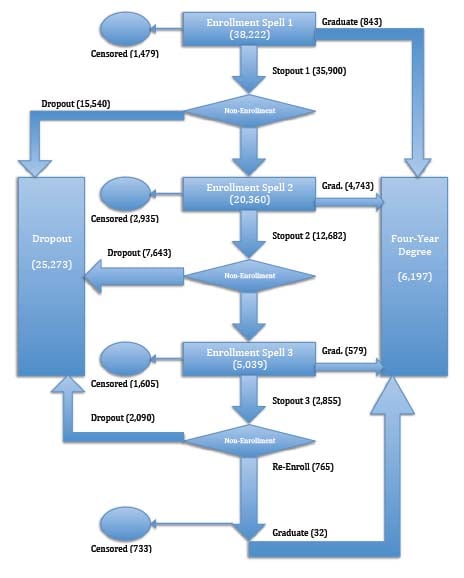You have /5 articles left.
Sign up for a free account or log in.
Community college students face long odds of eventually earning a bachelor’s degree. And those odds get worse if they leave college more than once along the way.
That is the central finding of a new study that tracked the progress of 38,000 community college students in Texas. Toby J. Park, an assistant professor of educational leadership and policy at Florida State University, conducted the research. His working paper was presented Thursday at the annual meeting of the Association for the Study of Higher Education in St. Louis.
The group of students he studied first enrolled in 2000. Among them, fully 94 percent “stopped out” of college at least once, by experiencing a "period of non-enrollment."
Most of the students returned to their studies, according to the paper, which is titled “Stop-Out and Time for Work: An Analysis of Degree Trajectories for Community College Students.” More than 20,000, or 72 percent, of the cohort came back to some Texas college in the sample, which used data from the Texas Education Agency, Texas Higher Education Coordinating Board and the state's comptroller.
Even students who eventually earned a bachelor’s degree were likely to spend time away from college. Only 13 percent of the 6,200 four-year degree-holders in the sample did not stop out.
However, the study found that 76 percent of those degree completers took only one break from college. After stopping out after a second time, the percentage of returning students completing a bachelor’s degree decreases substantially.
“If you leave twice,” Park said, “you’re not going to come back.”
Park could only guess at the reasons why. But he said a second stop-out could be indicative of “systematic barriers” to a student ever earning a bachelor’s degree, as opposed to the initial problems of adjustment and “exploration” for a first-time community college student.
The study found some variation among racial and ethnic groups. Interestingly, a second departure appears to be less of a problem for Hispanic students in the study, who nonetheless had relatively low graduation rates.
“The Hispanic population does come back and stay enrolled,” said Park.
The study did not factor in associate-degree completion, Park said. As a result, some students who graduated from community college are listed as dropouts in the below chart. And “graduation” in the study refers only to successfully earned bachelor’s degrees. (The term "censored" in the chart is for students who were still enrolled.)
Two-year degrees can be a final destination for students, experts have found, and one that leads to good-paying jobs. Park said he hopes to include associate degrees in future iterations of his analysis.
'Work Less, Study More'
There are many reasons why community college students stop or drop out. A common one is that many work while they go to college, often holding down full-time jobs.
Park’s study looked at the impact of wages on whether students earned a bachelor’s degree. He found that a raise can be bad news, at least when it comes to academics. And that negative impact on educational outcomes is disproportionate, Park said, particularly on graduation rates.
“While a percent increase in wages has a roughly 4 percent effect on the odds of stopping out,” according to the study, “we see a whopping 13 percent decrease in the odds of graduation.”
Not working isn’t an option for many community college students, as the study notes. But the “work less and study more” model clearly pays off for students who want to eventually earn a bachelor’s degree.
“While many factors influence overall success, it appears that those students who are working while continuously enrolled experience lower rates of academic success,” the study said. “Put differently, these students are working hard for the degree, yet not succeeding in attaining it.”
In his paper, Park argues that policy makers and education experts should consider using data about financial aid and wages to “provide a more complete picture of the college completion process for community college students.”
That picture is bleak. Nationwide, only one in four community college students earn a bachelor’s degree in six years, the study said. Likewise, 84 percent of the students in the Texas sample failed to earn a bachelor’s in six years, although 21 percent of those students were still enrolled in college.
When community college students in the study successfully transferred to a four-year institution, they were more likely to stay enrolled. They also were able to better weather a stop-out period.
“Perhaps those students successful in transfer are able to ‘see the light at the end of the tunnel’ in terms of degree completion,” the study said. “The successful transition between the two and four-year sectors, it appears, is important not only in graduating students, but also in keeping students in the pipeline toward eventual graduation.”








